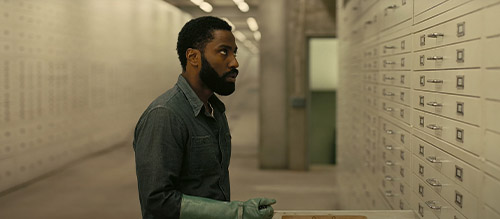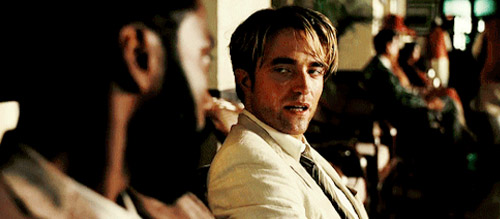Christopher Nolan’s Cinematic Chores: Understanding ‘Tenet’
*Spoilers Ahead
Over the past few months, the once routine idea of relaxing with a freshly popped tub of popcorn in a dark auditorium to enjoy the booming ecstasy of a new release has seemed like a far-away dream. Therefore, after dealing with the long-absence of communal theatre-going over the past six months, and with the recent reopening of cinemas up and down the UK, audiences have been chomping at the bit to once again sit back in the comfortable embrace of the big screen. But movie-goers might have to wait a little while longer if they want the enveloping, easy magic of cinema to wash over them once again; as cinema’s latest offering expects them to put in a little more work than they’re perhaps used to.
From the off, Tenet, Christopher Nolan’s time-muddling, espionage thriller starring John David Washington and Robert Pattinson, appeared shrouded in mystery; sold to us as an enigma with mysterious trailers teasing time-reversal, undercover spy organisations and the vague idea of ‘World War Three’. These puzzling clips were only aided and exacerbated by revealing on-set interviews with cast members, in which they confessed their whole-hearted confusion and hazy understanding as to the meaning of the complicated, action-packed endeavour they were involved in. There’s no doubt; as audiences wandered back into their long-abandoned, local theatres, they were more than prepped and ready to tuck in and decipher the mystery of Nolan’s latest blockbuster. Yet, since it’s first showing, Tenet has been generating marmite reviews, with some hailing the film a masterpiece, the likes of which we’ve never seen before, and others struggling to engage with or make sense of the impossibly convoluted plot. Tenet asks us to put our thinking hats on for sure, but could it be the case that Nolan’s eleventh feature asks too much of its audience? It seems the work Nolan expects his audience to do is proving polarising this time around.
Recommended for you: Tenet (2020) Review
Nolan frequently assigns his audience chores, engineering his films in such a way that requires them to participate in each narrative actively. Suppose we think of a movie as a rollercoaster, the typical movie gradually builds towards an epic peak, before tumbling to an exuberant conclusion; our job as the audience is to sit back and enjoy the ride. Nolan however, asks us not just to ride his rollercoaster, but to get off and help build parts of the track ourselves. Memento, his backwards neo-noir puzzle, employed us to unlearn how we watch movies; inviting us to take part in a reverse journey, on which we forage for enough information to piece together a linear narrative structure. Interstellar, his momentous space odyssey, asked us to wrestle with difficult scientific and mathematical principles; which made even the cleverest among us doubt ourselves. Inception, his multi-layered dream innovation, permitted us to choose the ending we most desired; with the wobble of Cobb’s totem signifying either his arrival back in reality or his failure to acknowledge the delusional fantasy of sleep. Even Dunkirk, perhaps Nolan’s most widely accessible film outside of his Dark Knight franchise, is structured in such a way that tasks audiences to fathom the fluctuating chronology of the war-epic narrative. In comparison to Tenet, however, Nolan’s previous films seem like a carefree stroll in the park.
There is no ready, steady, go! Tenet is happening, and it’s happening now. Nolan throws us in at the deep end, briefly pausing only to deliver us our first task:’ Don’t try to understand it, feel it.’ The line comes in the most expositional scene of the film, in which John David’s The Protagonist learns the basic rules of time inversion, and we are tasked with surrendering to the visceral experience of his journey. We learn that attempting to stay in control is a futile endeavour, as with each densely complicated scene, it eventually becomes apparent that any seemingly inconsequential moment could be of momentous significance. Yet, what does it mean to feel a movie such as this exactly? Should we stop looking for clues? It’s undoubtedly a request many cinema-goers are not willing to entertain, looking to prove themselves smarter than the sophisticated puzzle they were sold.
For the perceptive among us, or for those of us willing to commit to multiple viewings, as the film moves towards its conclusion, its complex ideas will begin to slot satisfactorily into place. Yet, what if you missed something? Say in ‘feeling’ the movie you failed to ponder the significance of something as small as a little red tag poking out of a particular someone’s backpack. Due to the overwhelming complexity of Tenet, it’s challenging to know the essential noteworthy scenes from those that simply bridge one moment to the next; it’s almost as if the film expects you to know in advance when to pay extra attention. Unable to catch every clue and unwilling to ‘feel’ the movie as Nolan instructed, many have become exacerbated with Tenet. However, it’s arguable that Tenet is not a code-cracking operation, that it is instead a trust exercise between audience and filmmaker. Although frustrating, perhaps the audience must trust that it isn’t vital to understand every single beat, and that they are more than capable of experiencing the significance of Nolan’s creation on feeling alone.
With this said; it isn’t precisely simple to tap into any kind of powerful feeling (even if you are willing to put in the work) given that the film lacks a substantial emotional crux. Due to their lack of personal motivation, it’s challenging to create a sympathetic connection with any character; with the exception perhaps of Elizabeth Debicki’s Kat, who seems to be the only character capable of communicating an emotion. The Protagonist moves from scene to scene with impenetrable coldness, seemingly lacking any discernible motivation. Yet, armed with only a single word, Tenet, he throws himself entirely into his covert work, willing even to die for a faceless, nameless organisation. Nolan does occasionally tickle our interest; hinting at pre-existing relationships which The Protagonist seems utterly unaware of: with Pattinson’s Neil, upon their very first meeting, ordering The Protagonist a glass of Diet Coke, his exact beverage of choice. While these moments allow us a glimpse at something hiding beyond our grasp, for the most part, every character appears to be only a rough sketch of the typical personalities you might find in your average spy-genre thriller. This lack of melodramatic substance alongside the significant bombardment of dense dialogue and convoluted temporal theory, not only makes it challenging to understand what’s going on, but also makes it difficult to know why we should even care.
Bad screenwriting? Or an entirely intentional choice? Let’s say it’s the latter. Once in possession of the complete narrative that Nolan is willing to share, it’s the audience’s job to fill in the blanks. You’ve heard of “show don’t tell”? Nolan takes it one step further, neither showing nor telling. The real trick to cracking Tenet’s complicated narrative is to focus on what remains unsaid; with Nolan asking us to use our imaginations to create character motivation. He does so by supplying us with slight clues as to what might exist in The Protagonist’s past and or future, but, ultimately, leaves it to us to connect the dots. While characters might feel underwritten, there’s enough in Tenet to work as the blueprint for two notable characters with one heck of a backstory. We can choose to run with Nolan’s hints, motivating Neil and The Protagonist entirely in our minds; dreaming up a friendship so profound we can begin to understand why they are willing to die for one another. In the case of Inception’s Dom Cobb, we were left to choose an ending. In the case of Tenet, Nolan gives us our conclusion but asks us to work backwards this time, in order to create a beginning and a middle that will lead us to the events we have witnessed. In essence, to understand what we have seen, we must attempt to understand what we haven’t seen. It helps to think of Tenet as a colouring book; Nolan has supplied us with the drawings, but it’s up to us to colour them in. What Nolan chooses not to tell us would make for good sequels… or prequels? But until we get them, if we ever do, it’s up to you to write them.
Nolan doesn’t make any of this easy; there are complications everywhere, not only for The Protagonist but for the audience too. Ludwig Göransson’s audaciously loud score permeates every scene, drowning out a great deal of loaded dialogue. Having been sold Tenet as a sophisticated puzzle, it makes sense to want to hang onto every word, to try to decipher any hidden clue that might unexpectedly unlock the mystery of what is happening on screen. It’s almost funny that Nolan makes it as difficult as possible to pick apart his dialogue. It’s as if the inaudible, clunky conversation is used as a deliberate red herring, consciously frustrating you, while also drawing you in further, encouraging you to look for clues in the wrong places. The same is true for the scientific and mathematical theory that builds the time-inverted world. The theory takes place in a fictitious world; it seems almost redundant to try to understand it, but, unable to help ourselves, we try to anyway. Many have assumed that an explanation lies in repeat viewings, which would be a worthy experiment if you’re willing to put in the man-hours. Yet given that, catching every word and deconstructing theory isn’t entirely essential for comprehending the premise of what Tenet aims to achieve. Arguably, enough can be gleaned from a singular viewing to piece together a suitably motivated, cohesive narrative—if you’re willing to use your imagination that is.
Palindromic themes run throughout Tenet, such as, a forward and backward car chase, the referencing to an ancient puzzle named the Sator Square, push-ups (which look the same in reverse as they do forwards) and the crashing of and a 747 aeroplane. Their existence in the film makes for pleasing Easter eggs; giving the viewer momentary gratification upon their realisation of Nolan’s neat tricks. With technical finesse, Nolan explores these themes, bouncing from one beautiful location to the next, relying on the camera and magnificent set pieces to celebrate the scale and scope cinema can capture. There’s no argument that Tenet is physically stunning to behold, but for many, this is where Tenet’s significance ends. With those unimpressed with the film, describing it as Nolan’s most egotistical movie so far; too tricky for its own good, relying too heavily on clever ‘Nolanesque’ novelties we have come to associate with the experimental director. For many Tenet lacks a gravitational pull, asking us to do too much and to fill in too many blank spaces. Where you come to stand with Tenet will depend on your willingness to engage with it, on your willingness to do the chores Nolan asks of you. We arrive, full circle, back at Memento, with Nolan asking us once again to unlearn how we participate with film. He asks us to give up the idea of being drip-fed information that will lead to an emotionally satisfying, comprehensible conclusion. What happens in Tenet happens because it always has, and it always will. How you organise and make sense of Tenet is down to you. Sure, the film has flaws, but, once again, they are what you make of them.
In a conversation with Neil, The Protagonist asks, in regards to the reversed flow of time, ‘Doesn’t us being here now mean it never happened?’ Meaning that, for The Protagonist to have met Neil in the future, doesn’t that mean they must have succeeded for Neil to have met The Protagonist in the past? ‘In short, yes’ Neil says, and goes on to explain the Grandfather Paradox to him, illustrating the loop of causality they are currently acting within. Both Neil and The Protagonist must behave as they do, and use the information they have extracted from both of their pasts and presents, to set into motion the chain of events they know must happen. Why? Well, because you can’t change the past.
The future, though, well… that’s up to you.
Recommended for you: Christopher Nolan Films Ranked




